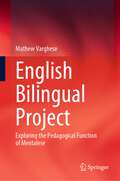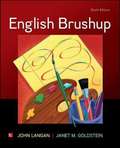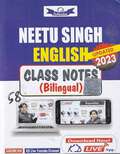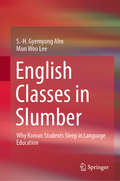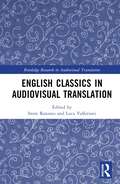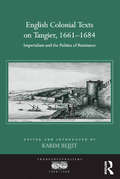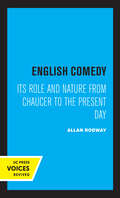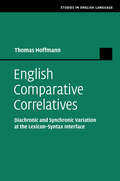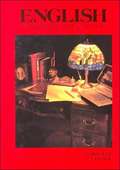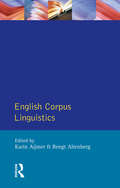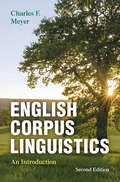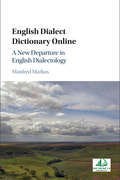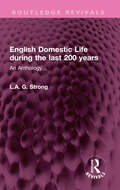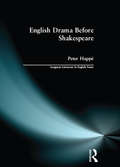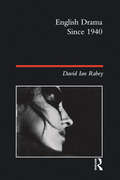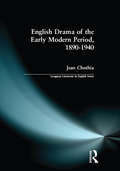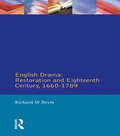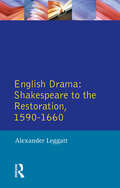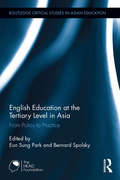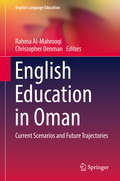- Table View
- List View
English Bilingual Project: Exploring the Pedagogical Function of Mentalese
by Mathew VargheseToday, English is the global lingua franca and competent English communication skills should be one of the rights of all educated individuals irrespective of any socio-cultural limits. By introducing a new method, this book focuses on helping any learner to get sufficient communication skills in English as much as in the native language. This method helps one to avoid translating from mother tongue to English. And by using the method of thinking in English, one could acquire the required English bilingual skills naturally. The method is founded on the philosophical idea of mentalese—mind language as the base language of thinking available for humans for constructing thoughts. The proposed English Bilingual Project (EBP) helps one to transfer thoughts from a structureless mentalese to the grammatical structure of any language English/Japanese/Chinese. The method described in this book works in two ways: one it helps one to intuitively understand the working of mentalese; the other is by practicing think in English with the mentalese, one could generate the bilingual brain. The main procedure for transferring thoughts from the mentalese to English is through writing one’s thoughts. This helps one to think effectively in English like one’s own mother tongue. This method works as a prime requirement model for one to generate multilingual skills. The book resourced the idea of mentalese from the classical philosophy, reflects it with the modern generative theories, links it with the studies in neuro-linguistic studies on bilingualism and the bilingual brain.
English Brushup (Sixth Edition)
by Janet M. Goldstein John LanganEnglish Brushup 6e offers a brief and inexpensive guide to the grammar, punctuation, and usage skills that students need most. It offers a combination of features not found in other texts. Its focus is on important skills, self-teaching approach, reasonable size, and outstanding instructor's supplements.
English Class Notes (Bilingual) - Neetu Singh - Competitive Exam
by Neetu SinghA full course book of English notes for those who want to appear general exams - in English with explanations in Hindi - for English language learners. There are 34 chapters with illustrated examples and previous years questions from main general examinations for different posts.
English Classes in Slumber: Why Korean Students Sleep in Language Education
by Mun Woo Lee S.-H. Gyemyong AhnThis book explains why some Korean high school students sleep during English classes in spite of the emphasized value of English in their society. It examines how this sleeping-in-class phenomenon can be understood by means of such marginalized students’ emic outlooks on themselves, the target language, their teachers, schools, and society/culture; and by means of the views of teachers who have experienced such in-class sleepers. To understand the phenomenon more holistically, it pursues a multi-disciplinary approach drawing on studies of demotivation and amotivation, psychological needs, and student experiences of schooling, as well as sociocultural theories of learning and agency and of interpersonal dynamics, among others. On the basis of a multi-modal analysis of interview data from the student and teacher participants, it theoretically interprets the phenomenon at the classroom (‘micro-’), school (‘meso-’) and society-culture (‘macro-’) levels. Taking a humanistic/existential approach to education, it subsequently presents a number of cultural actions that it advocates implementing in a situation-sensitive manner to help in-class sleepers and their educational institutions awaken from their chronic slumber. Lastly, it presents practical and theoretical implications for more humanistic pedagogy, and global studies of student disengagement, in English-as-a-foreign-language classes.
English Classics in Audiovisual Translation (Routledge Research in Audiovisual Translation)
by Irene Ranzato Luca VallerianiThis collection explores the translation of dialogue from the adaptations of literary classics across audiovisual media, engaging with the question of what makes a classic through an audiovisual translation lens. The volume seeks to fill a gap on the translation of classic texts in AVT research which has tended to focus on contemporary media.The book features well-known British literary texts but places a special emphasis on adaptations of the works of Jane Austen and William Shakespeare, figures whose afterlives have mirrored each other in the proliferation of film and television adaptations of their work. Chapters analyze myriad modes of AVT, including dubbing, subtitling, SDH, and voice-over, to demonstrate the unique ways in which these modes come together in adaptations of classics and raise questions about censorship, language ideologies, cultural references, translation strategies, humor, and language variation. In focusing on translations across geographic contexts, the book offers a richer picture of the linguistic, cultural, and ideological implications of translating literary classics for the screen and the enduring legacy of these works on a global scale.This book will be of interest to scholars in audiovisual translation, literary translation, comparative literature, film and television studies, and media studies.
English Colonial Texts on Tangier, 1661-1684: Imperialism and the Politics of Resistance (Transculturalisms, 1400-1700)
by Karim BejjitRecent years have seen growing academic interest in England’s colonial venture in Tangier in the late seventeenth century, and the crucial role it played not only in influencing contemporary domestic politics in England, but also in shaping new imperial policies in the Mediterranean. This critical edition presents a remarkable collection of 18 Restoration pamphlets dealing with the English occupation of Tangier. In an extensive original introduction, Karim Bejjit narrates the various stages of the colonial venture in Tangier, and critically analyses both the British historiography and current scholarship on the subject. He provides an alternative reading of the Tangier episode, emphasising the Moroccan point of view and the significance of the local political agency. At the same time, as the author argues in the introduction, so intertwined were the affairs of the colony and the home country in 1680 that the political crisis which was then unfolding in England cannot be fully explained without acknowledging the impact of dramatic developments in Tangier. Despite their generic diversity, as Bejjit shows, the pamphlets in this collection share a common interest in the affairs of Tangier, and reflect the changing circumstances and shifting politics at home and in the colony. In bringing together these long forgotten narratives, this edition revives critical interest in the colonial adventure in Tangier which had considerable influence on the political scene in England. Read collectively, the texts offer a genuine glimpse into the colonial scene and the interplay of forces which governed English presence in Tangier.
English Comedy: Its Role and Nature from Chaucer to the Present Day
by Allan RodwayThis title is part of UC Press's Voices Revived program, which commemorates University of California Press’s mission to seek out and cultivate the brightest minds and give them voice, reach, and impact. Drawing on a backlist dating to 1893, Voices Revived makes high-quality, peer-reviewed scholarship accessible once again using print-on-demand technology. This title was originally published in 1975.
English Comparative Correlatives: Diachronic and Synchronic Variation at the Lexicon-Syntax Interface (Studies in English Language)
by Thomas HoffmannOne of the most intriguing features of languages is that speakers can produce novel grammatical utterances that they have never heard before. Consequently, most linguists agree that the mental grammars of speakers are complex systems that must be more abstract than the input they are exposed to. Yet, linguists differ as to how general and abstract speakers' mental representations have to be to allow this grammatical creativity. This book addresses this issue by empirically investigating one specific construction, English comparative correlatives (e.g., the more you eat, the fatter you get). Drawing on authentic corpus data from Old English to Present-day English varieties around the world, it shows how input frequency and domain-general cognitive principles affect the complex mental network of constructions that underlies speakers' linguistic behaviour. This pioneering and original study will be of interest to scholars and students of English syntax and English historical linguistics.
English Composition And Grammar, First Course: Grade 7
by John E. WarrinerEnglish composition and grammar: First course
English Composition and Grammar (Fourth Course, Benchmark Edition)
by John E. WarrinerThis textbook is designed to help student improve his ability to use English. It shows how the English sentence works, how words are combined in sentences, and how the parts of sentences may best be arranged for clear communication. The contents of this five Parts book are: Composition: The Writing Process, Composition: Writing and Revising Sentences, Tools for Writing and Revising, Resources for Writing and Studying, and Speaking and Listening.
English Composition and Grammar (Second Course, Liberty Edition)
by John E. WarrinerThis textbook helps students master these three areas -- grammar, composition, and speech.
English Composition and Grammar: Complete Course (Benchmark Edition, Grade #12)
by John E. WarrinerThis textbook is designed to help you master the skills required for the effective use of standard English. Although the book will help you to speak better, its primary purpose is to help you to write better.
English Coordinate Constructions
by Arne LohmannDrawing on extensive corpus-based research, this book explores the nature and behavior of coordinate constructions in three case studies, covering order in copulative compounds, binomials (bare phrases), and more complex phrases. Historically, research on order in coordination has concentrated on so-called irreversible binomials, but Lohmann's research places significant focus on reversible ad hoc coordination and also presents a detailed comparison between irreversible and reversible binomials. This book uses empirical analyses to explore a wide range of factors, ranging from pragmatic to phonetic influences on the ordering process. It also offers readers a processing perspective on the results obtained, and puts forth a processing explanation for the characteristics of irreversible binomials. The book is ideal for researchers and advanced students working in English linguistics, syntax and psycholinguistics, and due to the multifactorial methodology applied it will be of particular interest to quantitatively minded corpus linguists.
English Corpus Linguistics
by Karin Aijmer Bengt AltenbergThis collection of articles form a tribute to Jan Svartvik and his pioneering work in the field. Covers corpus studies, problematic grammar, institution-based and observation-based grammars and the design and development of spoken and written text corpora in different varieties of English.
English Corpus Linguistics: An Introduction (Studies In English Language Ser.)
by Charles F. MeyerCorpus linguistics is a research method which draws on authentic language examples, collected and organized into 'corpora', or searchable 'bodies' of data. The method was established in the 1960s, and has rapidly developed since then. Now in its second edition, this book provides a step-by-step guide on how to create and analyze linguistic corpora. It has been extensively updated to reflect the most recent developments in this ever-evolving field, and now covers the empirical foundation of corpus-based research, new methodological considerations that guide the creation of a corpus, new kinds of research that can be conducted on corpora, and the most up-to-date information on how qualitative and quantitative analyses of corpora are conducted. Theoretical approaches are introduced in an accessible, easy-to-read way, and the book is illustrated with a wide range of different linguistic corpora, making it essential reading for researchers and students in a number of subfields of linguistics.
English Dialect Dictionary Online: A New Departure in English Dialectology
by Manfred MarkusJoseph Wright's English Dialect Dictionary (1898-1905) is the most comprehensive English dialect dictionary ever written, documenting in detail every dialect of English in the British Isles and Ireland, as well as the USA, Canada, South Africa, and other colonial regions. Over the past ten years, it has been brought to life digitally as a freely available database resource, EDD Online, which provides access to this rich collection of dialect data. This book is a comprehensive user guide to EDD Online, showing how to get the most out of this unparalleled resource with step-by-step instructions, illustrated with handy screenshots, and an appendix containing full colour figures. It also considers dialectological issues from phonetics to pragmatics, and how searches can be tailored to specific linguistic concerns, demonstrating the interface's enormous potential to contribute to research in a range of disciplines, from dialectology, to fields such as historical linguistics, corpus linguistics, lexicography and sociolinguistics.
English Domestic Life during the last 200 years: An Anthology... (Routledge Revivals)
by L.A. G. StrongFirst Published in 1942, English Domestic Life presents an anthology that gives as complete a picture as possible of the English domestic scene during the last 200 years. With Fielding we accompany an eighteenth-century family to the theatre to see Mr Garrick in Hamlet; with Thackeray we see Mrs Rawdon Crawley going to Court; with Meredith we taste the delights of wine; with Galsworthy we enjoy a Forsyte dinner; and so on. The mass material from which L. A. G. Strong has made this selection is enormous; he has therefore been rigidly selective, and, believing that representation of the subject is more important than representation of authors, has made an anthology as entertaining as it is instructive. Among many others, selections have been taken from the work of Jane Austen, Dickens, Bennett, Walpole etc. This selection is a must read for scholars and students of English literature.
English Drama Before Shakespeare (Longman Literature In English Series)
by Peter HappeEnglish Drama before Shakespeare surveys the range of dramatic activity in English up to 1590. The book challenges the traditional divisions between Medieval and Renaissance literature by showing that there was much continuity throughout this period, in spite of many innovations. The range of dramatic activity includes well-known features such as mystery cycles and the interludes, as well as comedy and tragedy. Para-dramatic activity such as the liturgical drama, royal entries and localised or parish drama is also covered. Many of the plays considered are anonymous, but a coherent, biographical view can be taken of the work of known dramatists such as John Heywood, John Bale, and Christopher Marlowe.Peter Happé's study is based upon close reading of selected plays, especially from the mystery cycles and such Elizabethan works as Thomas Kyd's The Spanish Tragedy. It takes account of contemporary research into dramatic form, performance (including some important recent revivals), dramatic sites and early theatre buildings, and the nature of early dramatic texts. Recent changes in outlook generated by the publication of the written records of early drama form part of the book's focus. There is an extensive bibliography covering social and political background, the lives and works of individual authors, and the development of theatrical ideas through the period. The book is aimed at undergraduates, as well as offering an overview for more advanced students and researchers in drama and in related fields of literature and cultural studies.
English Drama Since 1940 (Longman Literature In English Series)
by David Ian RabeyEnglish Drama Since 1940 considers the bids of successive post-war dramatists to find language and images of remorseless disclosure, appropriate to the public manifestation of sensed crisis and the interrogation of the ideal of renewal. This book introduces the period and its discourse whilst redefining them, to give proper consideration to developments of themes, styles, concerns and contexts from the 80s to the present. The book offers succinct and analytical introductions to the work of 60 dramatists, whilst arguing for (re)appraisal of many dates critical perspectives, in order to stimulate further argument in the field.
English Drama of the Early Modern Period 1890-1940 (Longman Literature In English Series)
by Jean ChothiaThe period 1890-1940 was a particularly rich and influential phase in the development of modern English theatre: the age of Wilde and Shaw and a generation of influential actors and managers from Irving and Terry to Guilgud and Olivier.Jean Chothia's study is in two parts beginning with a portrait of the period, setting the narrative context and considering the dramatic social and cultural changes at work during this time. It then focuses on some of the main themes in the theatre, from Shaw and comedy, to the rise of political and radio drama, providing an interpretative framework for the period. This volume will be of great benefit to students and academics of English literature and drama, as it covers the work of the major dramatists of the period as well as considering the dramatic output of literary figures, such as James, Eliot and Lawrence.
English Drama: Restoration and Eighteenth Century 1660-1789 (Longman Literature In English Series)
by Richard W. BevisWhat were the causes of Restoration drama's licentiousness? How did the elegantly-turned comedy of Congreve become the pointed satire of Fielding? And how did Sheridan and Goldsmith reshape the materials they inherited? In the first account of the entire period for more than a decade, Richard Bevis argues that none of these questions can be answered without an understanding of Augustan and Georgian history. The years between 1660 and 1789 saw considerable political and social upheaval, which is reflected in the eclectic array of dramatic forms that is Georgian theatre's essential characteristic.
English Drama: Shakespeare to the Restoration 1590-1660 (Longman Literature In English Series)
by Alexander LeggattThe most important period in the history of English drama is revealed in Alexander Leggatt's challenging account. The author considers English drama from the beginning of Shakespeare's career to the restoration of Charles II. Focusing on Shakespeare and the development of his art, he examines all his major contemporaries: Jonson, Middleton, Webster, Beaumont, Fletcher and Ford. He combines close analysis of specific plays with a broader look at trends within drama.
English Education at the Tertiary Level in Asia: From Policy to Practice (Routledge Critical Studies in Asian Education)
by Bernard Spolsky Eun Sung ParkThis is the third volume of a trilogy on English Language education in Asia within the Routledge Critical Studies in Asian Education. Put together by editors and contributors selected by Asia TEFL, this book provides a timely and critical review of the current trends in tertiary level English education in Asia. It foregrounds the developments and trends, policies and implementation, as well as research and practice. Written by ELT scholars and educational leaders, this book presents articles on China, Hong Kong, India, Japan, Korea, Malaysia, the Philippines, Singapore, Thailand, and Vietnam. While the authors focus on their own local issues, providing an overview of the state of tertiary English teaching in their respective territories, they also provide insights from their successes and failures which can help inspire solutions to similar challenges faced internationally in the field. Chapters in the book include: • Heading toward the global standardization of English education in Korean universities • English in tertiary education in India: A Janus-faced perspective with special reference to University of Delhi • Developing English language skills in the Singapore higher education context • ELT at tertiary institutions in China: A developmental perspective This book will be valued by administrators, researchers and scholars interested in bilingualism, language policy and planning in higher education.
English Education in Oman: Current Scenarios and Future Trajectories (English Language Education #15)
by Rahma Al-Mahrooqi Christopher DenmanThis book explores an area that has been somewhat overlooked in the literature to date – the current status and future trends of English education in Oman. It offers a variety of theoretical and methodological approaches to the subject and explores areas of English education in Oman that have, until now, been little investigated. It explores these issues from a variety of perspectives: the professionalization of English teachers in the country; the implementation of novel teaching methodologies, curricula, and assessment approaches, into what are, in many ways, still very traditional education settings; the integration of learner identity into English language instruction; country- and culture-specific concerns with conducting research with Omani participants; the strategic demands of building stronger links between education and workforce needs; and developing learner autonomy and motivation.
English Essentials
by John Langan Beth JohnsonIn the words of the text's best-selling author, John Langan, "Grammar books can be really dull. But they don't have to be. English Essentials is a new text that makes grammar, punctuation, and usage interesting--with pictures, stories, and activities students will enjoy. " The affordable price, ease of use, and simple, familiar language distinguish this engaging text from others on the market.
